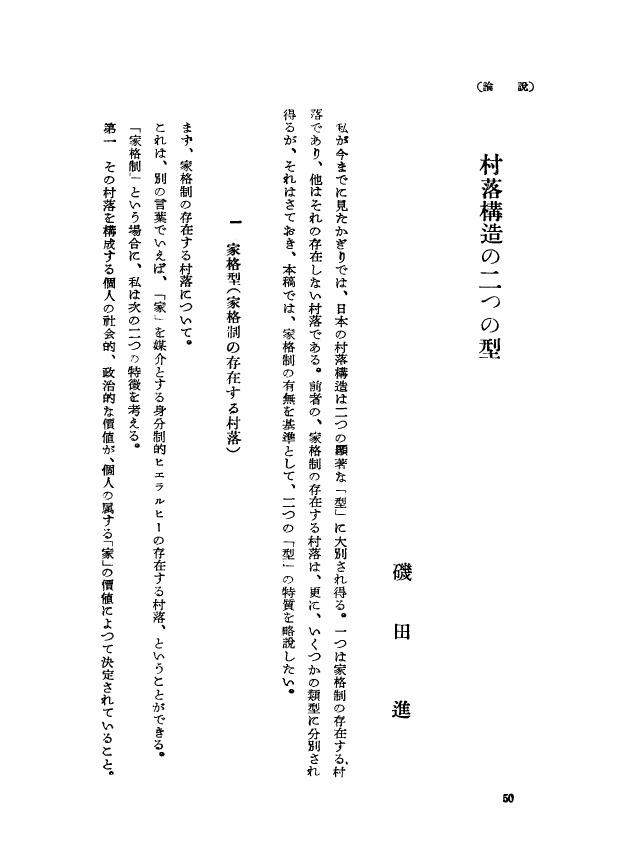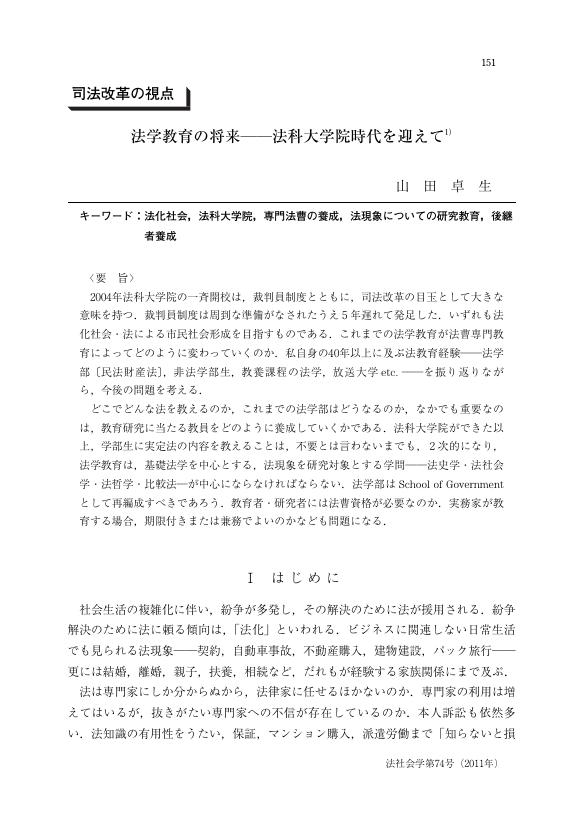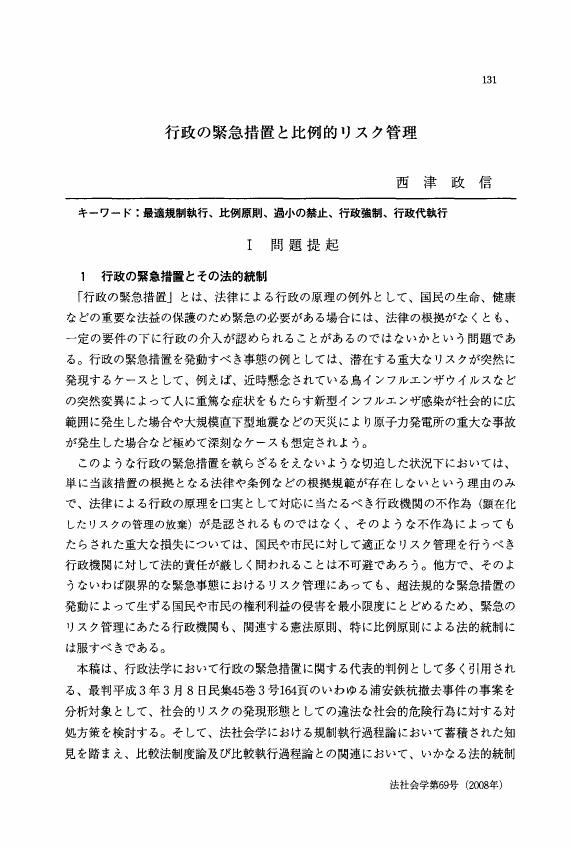2 0 0 0 OA 裁判官の判断構造
- 著者
- 松村 良之 太田 勝造 岡本 浩一
- 出版者
- 日本法社会学会/有斐閣
- 雑誌
- 法社会学 (ISSN:04376161)
- 巻号頁・発行日
- vol.1997, no.49, pp.198-202,247, 1997-03-30 (Released:2009-01-15)
- 参考文献数
- 13
Japanese judges usually spend their entire legal career as judges. Many of their legal jargons are unique to their professional circle and reflect their cognitive structure about legal issues."Suji" and "suwari" are among such most frequent jargons. "Suji", whose lexical translation is "line", is often used in a phrase "suji ga warui", meaning "suji is bad for this case". Such a phrase might be translated into "this case has a bad logic or an unclear background". The phrase is typically used to describe civil cases, and is less often spoken of by other legal professionals. "Suwari", whose direct translation is "well-seatedness" is similarly phrased, but it is, arguably more often used to describe judgments that are already made at courts of lower level.The present study is an attempt to give quantitative description of these two concepts by a cognitive psychological approach. As the first stage of our study, we made intensive interviews to seven retired or current judges. Based upon the interview result, we structured the questionnaire.As the second and final stage, we sent out the questionnaires to all the retired judges in Japan (1, 120), out of which 339 were returned. The respondents were asked to respond in psychological judgment scales, to fictitious cases in which some crucial details were manipulated as experimental variables. Statistical analyses on these variables are worked out to render experimental description of these concepts as correlates to and functions on more direct legal perceptions.
2 0 0 0 OA 福井報告へのコメント
- 著者
- 佐藤 岩夫
- 出版者
- 日本法社会学会/有斐閣
- 雑誌
- 法社会学 (ISSN:04376161)
- 巻号頁・発行日
- vol.1999, no.51, pp.176-177, 1999-03-20 (Released:2009-01-15)
2 0 0 0 OA 川島武宜著作集 第三巻
- 著者
- 松村 良之
- 出版者
- 日本法社会学会
- 雑誌
- 法社会学 (ISSN:04376161)
- 巻号頁・発行日
- vol.1987, no.39, pp.180-185, 1987-04-20 (Released:2009-01-15)
- 参考文献数
- 46
1 0 0 0 OA 手かざしは「治療」といえないか? 信仰にもとづく「医療ネグレクト」と宗教的マイノリティ
- 著者
- 吉岡 剛彦
- 出版者
- 日本法社会学会
- 雑誌
- 法社会学 (ISSN:04376161)
- 巻号頁・発行日
- vol.2012, no.77, pp.14-34, 2012 (Released:2021-04-19)
This paper focuses on faith−based medical neglect in order to analyze the problem, how should social majority, which manages legal system, respond to disobedience of religious minorities. As an object of case−study I take up an incident, in which a seven−month−old baby boy died of serious atopic dermatitis. In this case parents of the dead baby were arrested and prosecuted for Abandonment Causing Death by Person Responsible for Protection. Police and public prosecutor claimed, “These parents neglected to take their baby to the hospital and gave him no appropriate medical cure.” However parents did “cure” by means of “Therapeutic Touch” (placing their hands near a patient), based upon their religious belief. Their behavior was regarded as “medical neglect” by reason that they did not cure their baby based on Modern Western Medicine. In this paper I would show relativity and limitation of Modern Western Medicine (that Modern Western Medicine is one of various curing methods, therefore we could never say that Modern Western Medicine is the one and only appropriate medical cure) with the help of studies on “Complementary and Alternative Medicine” (CAM), History and Philosophy of Science, Medical Anthropology. In the end this paper comes to conclusion (1) that curing method based on Modern Western Medicine cannot be superior to other methods, for example, “Therapeutic Touch” on religious doctrine (both of them are in principle placed on an equal plane), (2) that “We” namely social majority should manage legal system and state power in moderate and reflective posture. In the discussion on moderation and reflectiveness it made reference to studies on “crime of conscience” in German legal philosophy, especially to Gustav Radbruch’s argument about “Überzeugungstäter.” Radbruch suggested that person (“Überzeugungstäter”), which commits to offense for political / religious reasons, should receive imprisonment without hard labor in order to save her / his honor.
1 0 0 0 OA 法と正義 その親和性と懸隔
- 著者
- 尾﨑 一郎
- 出版者
- 日本法社会学会
- 雑誌
- 法社会学 (ISSN:04376161)
- 巻号頁・発行日
- vol.2013, no.78, pp.62-73, 2013 (Released:2021-05-04)
Theories of justice premise that we can articulate and formulate the universal, comprehensive, and public justice. ‘Justice’ as such has affinity with ‘law’ or ‘adjudication.’ In the modern society, nevertheless, autonomous law, structurally differentiated from the other functional systems, has fundamental gaps from justice, though still making, or believing, its integrity and identity based on justice. In some situations, ‘justice’ is even invoked to criticize and reject law. Sociology of law, that is originally a reflection on excessive doctrinarism and dogmatism in jurisprudence, may utilize its sensibility when discussing and dogmatizing justice.
1 0 0 0 OA 法は身体をどのように捉えるべきか
- 著者
- 吉田 克己
- 出版者
- 日本法社会学会
- 雑誌
- 法社会学 (ISSN:04376161)
- 巻号頁・発行日
- vol.2014, no.80, pp.129-149, 2014 (Released:2021-05-04)
We can find in contemporary society increase of the proprietary nature of human body and aspiration for right of free disposal regarding human body. The importance of the problem how the law should catch the human body is increasing against these backgrounds. This report considers this problem, using this paper as material of comparison of France. The legal problem situation involving the human body is checked and the «human body = subject» theory and «human body = thing» theory which are two typical positions about the legal composition of the human body are examined on it. I would like to show a «human body as medium of subject» theory based on such work. The basic problem consciousness makes it possible to control commercialization and marketing of the human body appropriately, and is in the place which builds the human body theory which is effectively used against the infringement to the human body and can counterattack it.
1 0 0 0 OA ジェンダー平等と社会規範
- 著者
- 加藤 秀一
- 出版者
- 日本法社会学会
- 雑誌
- 法社会学 (ISSN:04376161)
- 巻号頁・発行日
- vol.2016, no.82, pp.69-80, 2016 (Released:2021-05-05)
Gender equality nowadays is (re)defined as equality not so much between men and women as equality between individuals, whose gender identities are various and often complicated. Although such a definition may show the progress in gender studies, what is important is whether or not it is useful as a tool to uncover and criticize inequalities in the real world. In this regard, it seems more and more obvious that the concept has been fraught with considerable difficulties. This paper illustrates some aspects concerning such difficulties and tries to suggest how to overcome them by means of reexamining the concepts of both “gender” and “equality.” First we propose a somewhat newly modified concept of gender, instead of traditional one based on dichotomy such as “biologically determined sex vs. socially constructed gender,” as social norms with respect to which we perform everyday practices of classifying and dividing people into just two groups. As for equality, from the perspective with regard to social norms that are present in our societies, it is necessary to pay much attention to the paradox such that to promote legal and institutional equality sometimes results with the reinforcement of stereotypical notions of masculinity and femininity under the condition that some women themselves desire the gendered norms. There is no sure remedy against such practical dilemma, but at least we can suggest a possible prescription for it: that is, to put greater emphasis on human rights that are provided in Article 13 of the Constitution of Japan than principles of equality in Article 14 when regarding to gender issues.
- 著者
- 秋葉 丈志
- 出版者
- 日本法社会学会
- 雑誌
- 法社会学 (ISSN:04376161)
- 巻号頁・発行日
- vol.2012, no.77, pp.35-64, 2012 (Released:2021-04-19)
The article examines the constitutional debate surrounding racial minorities in the United States, especially segregation and affirmative action, in light of social realities as evidenced in the San Francisco Bay area (especially Berkeley, Oakland, and Piedmont). It examines census data regarding socio-economic status, as well as standardized test scores, and finds a consistent pattern of racial segregation and racial disparity in the area. The article then looks at systematic factors that are not evidently related to race, but still has an impact on race. These include 1) the system of local government in the United States, which enable local residents to establish city boundaries and then to create zoning regulations within those boundaries, as well as 2) the financing mechanism of local governments that tends to result in disparities in school funding. These factors, combined with the U.S. Supreme Court’s reluctance to expand the reach of its integration decisions to de facto segregation, or to remedies beyond district borders, have made it difficult for integration to be implemented on the ground. In the end, the dominant tendency to distinguish official discrimination and segregation with disparity as a result of “individual choices”; and an aversion to recognizing persons on the basis of group attributes such as race or gender, delineates the limits of the power of law to improve the status of minority groups in the case of the United States. This could also be observed in the case of the debate over affirmative action, where the initial purpose of improving the status of minorities (as a group) in the educational setting have been replaced with the rhetoric of equal opportunity among individuals or benefits to the larger society (not the minority groups). Whether the law can go beyond the confines of narrowly delineated cause-and-effect and reach into the confluence of structural and institutional factors that result in disparity may be the key to a jurisprudence of minority rights.
1 0 0 0 OA 村落構造の二つの型
- 著者
- 磯田 進
- 出版者
- 日本法社会学会
- 雑誌
- 法社会学 (ISSN:04376161)
- 巻号頁・発行日
- vol.1951, no.1, pp.50-64, 1951 (Released:2009-04-03)
1 0 0 0 OA 第1分科会コメント
- 著者
- 戒能 民江
- 出版者
- The Japanese Association of Sociology of Law
- 雑誌
- 法社会学 (ISSN:04376161)
- 巻号頁・発行日
- vol.2001, no.54, pp.94-96,259, 2001-03-30 (Released:2009-01-15)
There are various implications which included in making women's experiences in sexual violence to be social issue. First, it includes violence of human rights of women. Secondly, it means gender motivated violence, and thirdly it justifies the victim's rights to restore the human dignity and independence. Therefore there should be created criminal justice system for protecting women from sexual violence as well as reform of rape law into which reflects the reality of victim's situation. At the same time, the attitude of jurisprudence should be more gender sensitive.
1 0 0 0 OA 尊重を論じる/言論を尊重する
- 著者
- エイベル リチャードL 藤本 亮
- 出版者
- The Japanese Association of Sociology of Law
- 雑誌
- 法社会学 (ISSN:04376161)
- 巻号頁・発行日
- vol.1998, no.50, pp.214-234,282, 1998-03-20 (Released:2009-01-15)
- 参考文献数
- 68
The feminist campaign against pornography, the furor over racial epithets, and Iran's death threat against Salman Rushdie exemplify the passions aroused by hurtful speech. Such conflicts are increasingly pervasive and intractable. Sociological theories of symbolic politics illuminate such confrontations as struggles for respect among status categories defined by nationality, religion, race, gender, sexual orientation and physical difference. The two conventional responses to harmful speech-civil libertarianism and state regulation-both are fundamentally flawed. Only apologies exchanged within the communties that construct collective identities can readjust their social standing and thereby equalize cultural capital.
1 0 0 0 OA 法学教育の将来――法科大学院時代を迎えて
- 著者
- 山田 卓生
- 出版者
- 日本法社会学会
- 雑誌
- 法社会学 (ISSN:04376161)
- 巻号頁・発行日
- vol.2011, no.74, pp.151-162, 2011 (Released:2021-01-18)
1 0 0 0 OA 行政の緊急措置と比例的リスク管理
- 著者
- 西津 政信
- 出版者
- 日本法社会学会
- 雑誌
- 法社会学 (ISSN:04376161)
- 巻号頁・発行日
- vol.2008, no.69, pp.131-146, 2008 (Released:2017-01-31)
1 0 0 0 OA 日向における婚姻の禁止
- 著者
- 上野 裕久
- 出版者
- The Japanese Association of Sociology of Law
- 雑誌
- 法社会学 (ISSN:04376161)
- 巻号頁・発行日
- vol.1954, no.5, pp.137-154, 1954-04-30 (Released:2009-04-03)
- 参考文献数
- 11
1 0 0 0 OA 法的責任判断に与える謝罪の影響
- 著者
- 山田 裕子
- 出版者
- The Japanese Association of Sociology of Law
- 雑誌
- 法社会学 (ISSN:04376161)
- 巻号頁・発行日
- vol.2000, no.53, pp.195-209,250, 2000-12-20 (Released:2009-01-15)
- 参考文献数
- 34
This study aims to clarify (1)whether the public and a victim of a crime might make different assessments, and (2)whether apologies of perpetrators might reduce such discrep-ancies. One of six scenarios was assigned to each subject, and the public and the victim, and levels of apology were manipulated. Each subject was required to rate the responsibility of the perpetrator. Analysis of variance revealed the effects of interaction between the public and a victim, and the apology, and indicated that an apology by the perpetrator reduced the discrepancy of the assessment between the public and a victim. Path analysis on the process of responsibility assessment suggested that apologies by the perpetrator improved the victim's assessment of "negligence of perpetrator" and "anger to perpetrator".
1 0 0 0 OA 国家/市場/共同体と公共性、法の役割 法と公共性の社会理論試論
- 著者
- 馬場 健一
- 出版者
- 日本法社会学会
- 雑誌
- 法社会学 (ISSN:04376161)
- 巻号頁・発行日
- vol.2008, no.68, pp.65-78, 2008 (Released:2017-01-31)
1 0 0 0 OA 埋葬と法
- 著者
- 森 謙二
- 出版者
- The Japanese Association of Sociology of Law
- 雑誌
- 法社会学 (ISSN:04376161)
- 巻号頁・発行日
- vol.2005, no.62, pp.87-98,193, 2005-03-30 (Released:2011-04-13)
- 参考文献数
- 35
The concept of "cemetery" in Japanese law, the ground which build graves, has been affected by the idea of ancestor worship, because the Code Civil of Japan positioned the graves as a device for ancestor religious services, which are entrusted with his descendant, and the graves which ancestor buried are reburied as the unrelated grave, if the descendant disappear.In Europe, the burial laws have regulations about "burial compulsion" and "burial duty", but in Japan the decisions whether the dead should be buried, are referred with his family or his descendant.The current system of Japanese burial and cemetery is not be effective, because it is not possible to produce an Atotsugi (successor), the continuation of religious worship is threatened due to the changing family structure and a declining birth rate.
1 0 0 0 OA 「法廷の秩序」研究の意義について
- 著者
- 小宮 友根
- 出版者
- 日本法社会学会
- 雑誌
- 法社会学 (ISSN:04376161)
- 巻号頁・発行日
- vol.2007, no.66, pp.162-186, 2007 (Released:2017-01-31)
1 0 0 0 OA 農業家族における均分相続の問題について
- 著者
- 神谷 力
- 出版者
- The Japanese Association of Sociology of Law
- 雑誌
- 法社会学 (ISSN:04376161)
- 巻号頁・発行日
- vol.1953, no.3, pp.98-115, 1953-01-15 (Released:2009-04-03)
- 参考文献数
- 26
1 0 0 0 OA 小宮友根著『実践の中のジェンダー―法システムの社会学的記述―』
- 著者
- 樫村 志郎
- 出版者
- 日本法社会学会
- 雑誌
- 法社会学 (ISSN:04376161)
- 巻号頁・発行日
- vol.2013, no.79, pp.229-234, 2013 (Released:2021-05-04)









